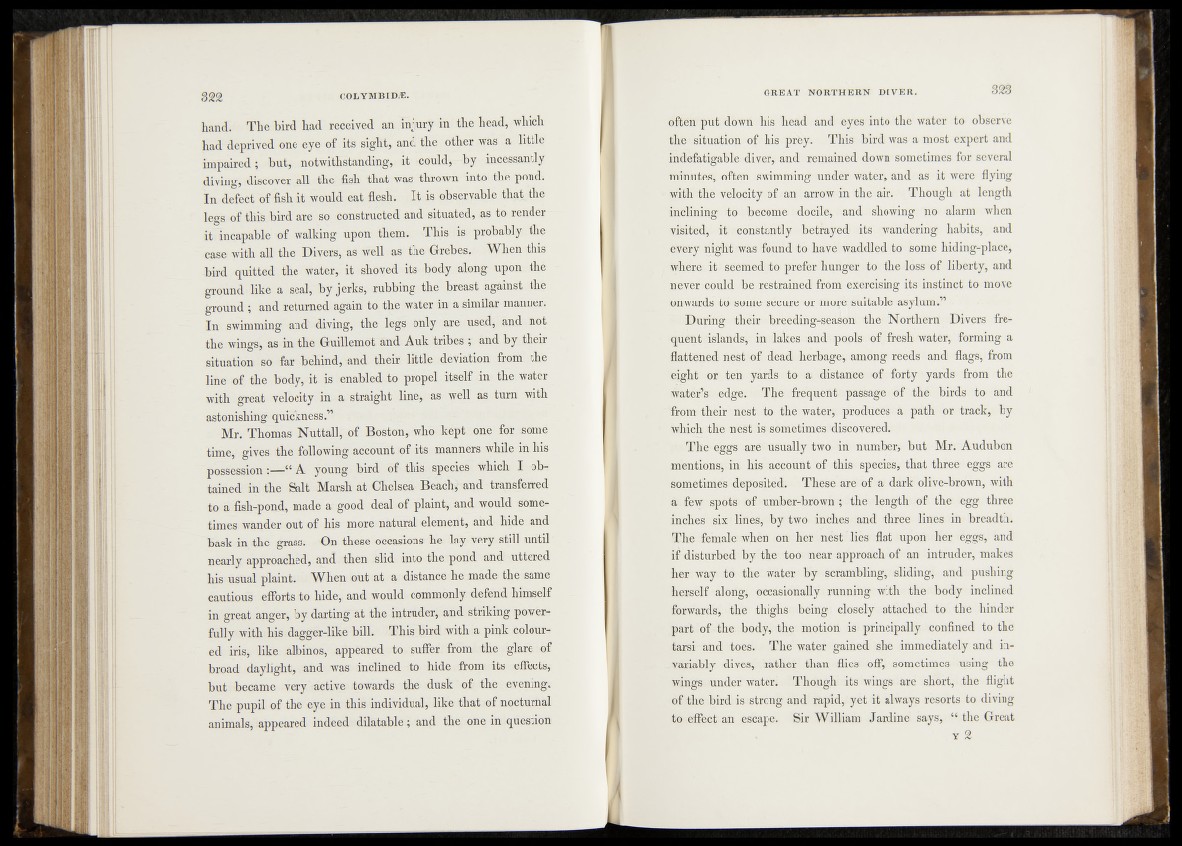
hand. The bird had received an Injury in the head,:which
had deprived one eye of its sight, and the . other was a
impaired ; but, notwithstanding, it ?eouïdrr*by incessantly
diving, discover all the fish that was thrown into* the pond.
In defect of fish it would eat flesh, It-is observable th ^ th e
legs of this, bird are so Constructed and situated, as to render
it Incapable of walking upon them. 'This is probably-the
case with all the Divers, as well as the Grebes. Wheftébis
bird quitted the water, it shovecUits body_alongr upon the
ground like a seal^by jerks, rubbing the breast Against,the
ground ; and returned' again torthe water in a similar manner.
In swimming and? diving, the legs only are used, i and not
the wings, as in the Guillemot and Auk trihjfs^ and byitheir
situation so far behind, and their- little déviation from the
line of the body, it is enabledio propel itself imhb^wàtèr
with great velocity in a straight line, as well as turn with
astonishing quickness;’*
Mr. Thomas Nuttall, of Boston, who k ëp t^ h e for ‘some
time, gives the following account of its manners whiles in his
possession :—“ A young bird of - -this, species which I obtained
in the Salt Marsh at: Chelsea- Beach^und transferred
to a fish-pond., made a: good deal of plaint, and would Some*
times wander out of his more natural element, and hj.de und
bask in the grass. On these occasions he lay-veryspl until'
nearly approached, and then-slid into theipond andhuttered
his-usual plaint. - When out at a distance he mâder the fsamfi
cautious efforts to hide,- and would commonly defend himself
in great anger, by darting”at the intruder, and striking power*
fully-with, his dagger-like bill. This bird with a pink coloured
iris,, like, albinos, appeared do, suffer, from the glare of
broad daylight, and was inclined to hide from its effects,
but became very active towards the dusk” of: the evening.
The pupil of the eye in this individual, like that of nocturnal
animals, appeared indeed - dilatable ; and the one in question
often' put down Ms head and eyes into the water to observe
thé5 situation of«his prèy. This bird was a most expert and
indefatigable diver, and remained down sometimes for several
minutes* often swimming undèr water, and as it were flying
with the velocity of an arrow in the air. Though at length
incliningM#'i?beeome A'cite,£and showing no alarm when
visited, i f ■ constantly betiayed- its wandering habits, and
night was?foürid'tó 'have waddled to some hiding-place,
WhleW it? sééme'd^tk) prefer-hunger-to - the lóss of liberty, and
.be-restrained from exercising its instinct to move
onwards to some*-sècipe’.'D’r moréj'&uitable-asylum»” -
’ During -their'hreèdingrseasön- the' Northern Divers frequent'islands,
in lakes amKpools of fresh water, forming a
flattened nest-of dead herbage, among reeds and flags, from
eight or . ten yards :t©'\ia- distance of forty yards from the
Water’s edge. * The frequent' passage of the birds to and
ffrom dhèirsnest^to the water* produces-a path or track, by
which the nest is- sometimes 'discovered-.- -
.- The-eggs are? visually’two in number, but Mr. Audubon
mentions, in> his .account of-this species, that three eggs are
sometimes deposited; - These are of a dark- olive-brown, with
a few* spots of umber-bröwn * the- length of the egg three
.inches'’six lines* >by two inches and three lines in breadth.
The .femalewhen on her nést lies- flat upon her eggs, and
if'disturbed’by the too near approach of an intruder, makes
her way to the: water by scrambling, sliding, and pushing
herself along, occasionally running with the body inclined
forwards, the' thighs being : closely attached to the hinder
part of-the: body,- th e . motion is principally confined to the
tarsi and toes. The water gained she immediately and invariably
dives, , rather than flies off, sometimes using the
wings . under, water; Though its wings are short, the flight
of the bird is . strong and rapid, yet it always resorts to diving
to effect an escape. Sir William Jardine says, “ the Great
y 2